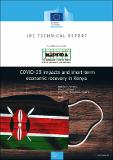COVID-19 Impacts and Short-Term Economic Recovery In Kenya
View/
Publication Date
2020Author
Type
Policy Paperviews
downloads
Metadata
Show full item recordBy
Nechifor, V; Ferrari, E.; Kihiu, E.; Laichena, J.; Omanyo, D; Musamali, R. & Kiriga, B.
Abstract/
This technical report focuses on the short-term implications on the wider Kenyan economy of the COVID-19 lockdown by taking into account several impact channels (labour productivity, export demand and tourism, remittances, internal demand and internal trade costs). It considers the uncertainty of lockdown durations both domestically and abroad and incorporates the government fiscal and spending measures implemented through the Tax Laws (Amendment) Act, 2020, the COVID Spending Plan and the Economic Stimulus Plan. In annualized terms, the modelling results of this study show that the April-June lockdown in Kenya would have an impact of 5.6% in GDP in 2020 relative to the pre-COVID baseline leading to close to zero economic growth for the year. The main drivers of the reduction in economic activity are the drops in labour productivity, in export commodities and in tourism. The GDP decrease is accompanied by a depreciation of the Kenya Shilling (KSh), a reduction of domestic investment and an increase in government deficit by 17.2 billion KSh. Employment reduces by 11.8% and real income decreases by 7.9% and 6.8% for rural and urban households respectively. The lower income determines a decrease in domestic demand and lowers market prices for the majority of commodities. The impacts of the pandemic would be amplified if a new COVID-19 wave were to emerge in the second part of 2020.
Publisher
Kenya Institute for Public Policy Research and Analysis (KIPPRA)Series
Special Paper: 2020Collections
- Special Papers [27]

